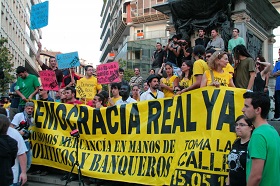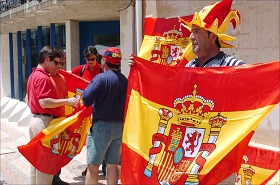Challenged by globalization and increasing competition from new social movements that form organically via the Internet, political parties – traditionally the main vehicle for the expression of popular demands and mobilization – are rapidly changing. Due to this dramatically different environment, which is fraught with the risk that they will lose electoral support and clout, many parties have to radically refurbish their fundamental approach to politics and organization. The situation is especially grave for parties in countries that can be defined as being in the late, peripheral and semi-peripheral stages of capitalism, whose structure and political practices retain the historical traits of authoritarian and bureaucratic governance. In this context, the Spanish example – which saw confrontation between new social movements and mainstream parties – is remarkably striking.
The Caudillistic Parties of Spain
In Spain, political parties are of paramount significance, as they control virtually the entire political space, with the election-winner coming to the helm and essentially merging with the state structures. They hold all key state institutions via handpicked appointees, i.e. the General Council of the Judiciary, the Constitutional Court, the Bank of Spain and the Court of Accounts, all of which should, under the classic definition of democracy, be independent. A peculiar system emerged as the country made the transition from the Franco regime to democracy. Bearing in mind the intricate shifts underway during the Second Republic of 1931-1939, which triggered a civil war, the country’s politicians chose to maximize the nascent democracy’s governability by endowing party elites with virtually unrestricted powers in the belief that "stable parties bring stable democracy." [1]
Having inherited this tradition, political parties have to date worked to hierarchic principles and remain essentially Caudillistic, with all decisions taken by the leaders and their associates, who appoint and remove party officers, hold conventions and manage party funds, ruling out any kind of open discussion.
The party elite's omnipotence is vividly illustrated by the "closed party lists" introduced in 1977 for parliamentary, autonomous and municipal elections. Under this procedure, the electorate may only vote for figures listed en masse, with no option of adding new names. There is nobody to appeal to, and most deputies and senators remain absolutely unknown to the electorate.
On the one hand, closed voting lists estrange people from politics, while on the other they promote party oligarch-ization and corrupt junior party members. At the same time, the principle of separation of powers is fading away, since both parliament and government are formed from these closed lists and fall under party rule. Notably, there is widespread agreement within Spain that the electoral system needs to be reformed, but this is not likely to happen, as the party heads are unwilling to cede their dominant position regarding domestic policies.
Parties beyond Control
The Spanish case seems abnormal because the party leader and his entourage set the rules of the game, but remain beyond any kind of control. The 1978 Parties Law was amended in 2002, but is still regarded as hollow as it fails to regulate party activities [2]. The absence of external supervision and intra-party democracy provides a fertile breeding ground for numerous vices, primarily pervasive corruption. Although some degree of corruption can be expected in any party in any country, there are usually intra-party mechanisms to support democracy and ensure corruption is contained. For example, German law obliges parties to hold conventions every two years, at which delegates and candidates for elected party positions are chosen by the rank-and-file through secret ballot. Parties are also subject to obligatory inspection by independent auditors.
In the absence of mechanisms to establish and support intra-party democracy, financial transparency and independent auditing, the all-powerful Spanish party bigwigs are free to replace elections with cooptation and institutionalized corruption.
Predictably, the Spanish general public has little trust in parties or politicians, with 95 percent of respondents convinced that the parties "cover up and protect their corrupt members rather than exposing and expelling them", while 55.1 percent of those surveyed believe that "the parties serve to disengage people" [3]. To a great extent, this latter view comes from that highly tense relationship between the center-right Peoples Party and the center-left Spanish Socialist Workers' Party, which between them cover 80-85 percent of the electorate and have aligned positions on many issues.
The Indignados: Traditional Parties and Traditional Politics Challenged
The drop in confidence points to a deep systemic crisis within Spanish society that has given rise to a new form of social protest, the indignados movement that appeared on May 15, 2011, when streets and squares in 58 Spanish cities were occupied by people setting up tent camps and demanding radical change. The disturbances lasted several months, but in contrast to many other countries, the indignados demanded neither the government’s resignation nor power for themselves. They were protesting against the ignominious politics-as-usual, and demanded policies of an utterly different quality, so that Spain’s democracy could start to work in practice and reach universally accepted standards [4].
Striving to overhaul the national political and economic system, the indignados have neither a clear-cut and complete ideological and political platform nor a list of priorities. In a way, they know what they are against but fail to clearly outline their goals. The command center, leaders and hierarchy are also nonexistent. In fact, it amounts to a new kind of popular social movement that emerged through self-organization and social media, without any sort of party involvement. Consequently, Spain became a country in which large groups of people can be mobilized via the Internet in no time. Unlike the common vertical Caudillistic party building process, this movement is horizontally organized. In fact, the indignados want direct democracy with as few intermediaries as possible between the leaders and the grassroots.
Spanish democracy has not yet seen such numerous and extended popular protests. After the 2011 unrest, the indignados remained on the scene, repeatedly coming out onto the streets to support their crisis-stricken compatriots. In May 2013, 78 percent of Spanish respondents said that the indignados "were doing the right thing" [5].
Protesting against traditional politics, the indignados effectively unnerve the Spanish parties. As shown by the 2011 parliamentary elections, the Spanish traditional bipartisan system is fading, while the Peoples' Party and the Socialists are no longer free to impose their will through concerted action. And it was the Left who have been more gravely affected by this new competitive force. By deepening the essentially disengaged or alienated Left, the indignados have significantly weakened the Socialist Workers' Party, which suffered an unprecedented defeat at the 2011 parliamentary elections (28.7 percent of the vote and 110 seats against 43.6 percent and 169 seats in 2008) and went into opposition [5]. Remarkably, after losing the election the Socialists have been definitely mimicking the indignados’ approaches by coming out against authoritarianism and bureaucracy and standing for intra-party democracy and election of leaders at the grassroots level.
Party X, Party of the Future
However, the Spanish case has shown that this new form of social protest, although supported by millions, cannot replace parties. Outraged both by partisanship and by politics in general, most Spanish people continue to turn out to vote, since partisan allegiance remains integral to popular political culture.
Aware of this attitude, some indignados have started to introduce more structure into their ranks. In December 2012, the Spanish party roster was augmented by Party X, Party of the Future aiming to "reset the system and restore democracy" and using the Internet as its only tool of mass mobilization. This new entity supports citizens’ direct participation in developing laws and government decisions on all issues through online voting. These new party activists believe that implementing this initiative could deliver popular control over politics, transparency regarding adopted laws and decisions, and an effective representative democracy [7].
Currently, Party X activists are working hard to analyze, with a view to later adapting them to their environment, the Icelandic project Better Iceland y Better Reykjavik and of the experience of the Brazilian state Rio Grande do Sul that uses direct participation and dialogue between the general public and different levels of government. In Rio Grande de Sol, citizens registered online are given access to bills and government decisions, as well as an opportunity to put forward their own proposals. Reflected among other things through electronic vote, societal attitudes are normally heeded by the authorities.
Activists within this emerging entity dissociate themselves from all kinds of partisan allusions and tend to prefer anonymity to "avoid personalization specific for political parties." At the same time, in October 2013 some launched presentations of their program, which are intended as the basis for an announcement expected in February about Party X’s participation in the European Parliament elections next May [8].
***
The new movements' methods and potentials to counter mainstream political parties in different countries are very different. The Spanish indignados do not seem strong enough to either oust the ruling elite or to force it to accept greater diversity in the dominant paradigm that governs how the political system is organized. However, the movement is quite able to mobilize the masses, and has already brought tens of thousands of people, already looking for the real cause of their problems, out onto the streets. The movement has also stolen a lot of votes from mainstream parties, with whose policies the electorate is disenchanted, benefitting minor parties. All this has prompted some active politicians to recognize the real need to improve party life principles. Many indignados are building an independent party of their own that may well yet have its say in future political battles.
1. Molinas C. Que hacer con España. Del capitalismo castizo a la refundacion de un pais. Madrid, 2013. P.215-216.
2. Ibid., p.214.
3. Сlaves de razon practica. Madrid, Junio 2011. P.12.; Elordi С. Quienes mandan de verdad en España? Barcelona, 2013. P.95.
4. See: Hablan los indignados. Propuestas y materiales de trabajo. Madrid, 2011.
5. El Pais, 05.11.2013.
6. Ibid., 11.21.2011.
7. Seguidores del 15-M y la cultura libre en Internet ponen en marcha el Partido Х.: http://politica.elpais.com/politica/2013/01/07/actualidad/1357586962_260864.html
8. Wikigobierno: http://wiki.15m.cc/wiki/Wikigobierno
9. El Partido Х inicia una gira por toda España antes de las europeas: http://www.elboletin.com/nacional/92003/partido-х-gira-espana-presentar-programa.html







